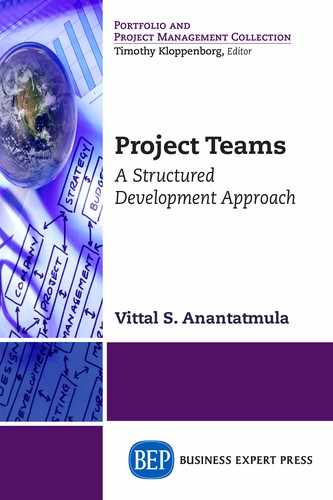Sustaining Effectiveness of Project Teams

Preview
This chapter presents a summary of what is presented and discussed in the book along with a few guidelines for assessing and sustaining effectiveness and success of project teams.
Projects are vehicles for organizations to meet their strategic objectives and operational goals. They are executed in teams and, as such, being a member of a team is an inevitable feature of modern work life. A project team comprises a selected group of individuals with complimentary skills and disciplines who are required to work together on interdependent and interrelated tasks for a predetermined period to meet a specific purpose or goal. Project teams can be traditional colocated teams, virtual teams, and global project teams. A few common attributes of a project team are: common purpose or goal, interdependence due to mutual accountability and collective responsibility, diverse skills, information sharing, and collaborative efforts.
In general, projects are managed using teams in a work environment that is complex for two reasons: first, each project is unique, and second, conditions for team selection and motivation are often far from ideal. In addition to uniqueness and complexity, unfamiliarity is often described as one of the characteristics of projects and, as a result, projects are often associated with change. Consequently, successful project performance requires strong leadership, which provides vision and ability to cope with change.
In effective project teams, each team member assigns preference to team’s objectives over individual differences and personal goals. Project managers should make an effort to align individual aspirations, and personal and professional goals with the project goals. One must be sensitive to the needs, aspirations, and goals of all other team members; it will influence the team’s performance and success. Even though each member of the team is a distinct individual with strong opinions about a lot of things, the team needs to have a single and identifiable direction for its activities. Effective teams create synergy among the team members to enhance creativity, productivity, and decision making. Team effectiveness will also have an impact on satisfaction of the individual team members and on the quality of their team assignment deliverable.
This book is aimed to provide an overview of selecting, structuring, developing, and managing project teams to improve collaborative effort and productivity in managing projects successfully, underlining the importance of various aspects of structuring and developing project teams:
A team structure design largely depends on the organization structure and culture to promote teamwork.
Organizations must focus on developing and sustaining team-related processes that would ensure continuity and continual improvement in team development.
Project teams require both management and leadership as stress and conflicts are bound to occur. Furthermore, it is a challenge to manage and guide team members to work collaboratively while dividing the work and multiplying the success. The key is to align goals or aspirations of individual team members with the project goals, and invest time in understanding individual strengths and building competencies wherever necessary.
Obstacles of political, cultural, virtual, and regional differences of global project teams influence the structure of global teams and it differs from that of a traditional project team. Communication, culture, and leadership assume importance in managing global projects. A formal approach to team development and management processes is necessary. Knowledge management and communication are key aspects of global project teams.
Developing a project team charter helps project teams to perform cohesively and manage project outcomes effectively. The team charter should clearly specify the goals and structure of the team, desirable performance attributes, performance guidelines and metrics, and behavioral expectations.
One cannot forget the rising number of Generation Y professionals (born in 1980 and after) who are part of the workforce and their impact on project teams. They would expect and believe in less emphasis on hierarchy and greater responsibility. Monetary benefit is less motivating than working relations and meaningful work.
Effectiveness of Project Teams
Organizations should focus on establishing organizational factors and team factors that would promote project team effectiveness and efficiency while keeping project success factors in mind.
The presence of organizational and team factors outlined in Table 7.1 defines the level of maturity in developing project teams. Organizations may choose to develop five levels of maturity, ranging from little teamwork and the presence of very few processes (level 0) to the presence of highest levels of cooperation, collaboration, trust, synergy, and innovation (level 4). However, these maturity levels are organization specific and would depend on the number of projects, project size, number of employers engaged in projects, and so on. Irrespective of the maturity model that an organization may develop to assess team processes and team effectiveness, it is important to review them periodically to explore options for continuous improvement of performance and effectiveness of project teams.
Table 7.1 Project team effectiveness
Project success factors |
Organizational factors |
Project team factors |
|
|
Define
Expect
|
